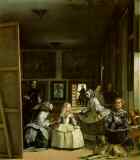|
King Philip IV as a
Huntsman
1634-35
Diego
Velázquez (1599-1660) Spanish court painter
Museo del Prado, Madrid
Oil on canvas
191 x 126 cm
Jpg:
Web Gallery of Art
From Web Gallery of Art:
Spain's greatest painter was also
one of the supreme artists of all time. A master of technique, highly individual
in style, Diego Velázquez may have had a greater influence on European
art than any other painter.
Velázquez lived in Madrid
as court painter. His paintings include landscapes, mythological and religious
subjects, and scenes from common life, called genre pictures. Most of them,
however, are portraits of court notables that rank with the portraits
painted by Titian and Anthony Van Dyck.
Duties of Velázquez' royal
offices also occupied his time. He was eventually made marshal of the royal
household, and as such he was responsible for the royal quarters and for
planning ceremonies.
Velázquez was called the "noblest
and most commanding man among the artists of his country." He was a master
realist, and no painter has surpassed him in the ability to seize essential
features and fix them on canvas with a few broad, sure strokes. "His men
and women seem to breathe," it has been said; "his horses are full of action
and his dogs of life."
As court painter to Philip IV, Velázquez
spent  a
large part of his life recording, in his cool, detached way, the objective
appearance of this rigidly conventional royal household, with little
interpretation but with the keenest eye for selecting what was important
for pictoral expression and with a control of paint to secure exactly
the desired effect. a
large part of his life recording, in his cool, detached way, the objective
appearance of this rigidly conventional royal household, with little
interpretation but with the keenest eye for selecting what was important
for pictoral expression and with a control of paint to secure exactly
the desired effect.
In painting these royal portraits,
whatever interpretation he made or whatever emotional reaction he experienced
he kept to himself. Royalty, courtliness of the most rigid character was
his task to portray, not individual personality.
(Web
Gallery of Art)
Notes
John
Singer Sarsgent

King
Philip IV
1879?
|





